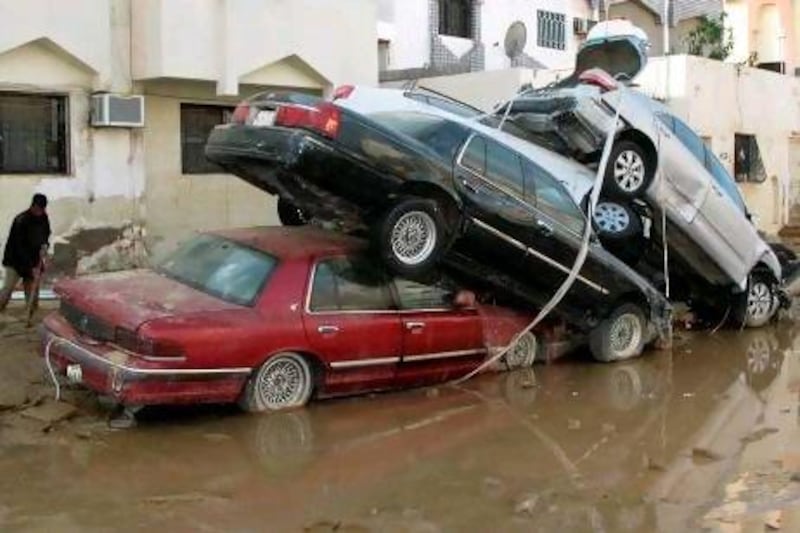This week, as Jeddah's former mayor and deputy mayor face trial in connection with the deadly 2009 flooding in November 2009, Walled Abu Al Khair, a lawyer, recalls how the disaster recast the city. More than 120 people died and 22,000 people were displaced by the flooding.
But when the waters receded, the real change was in perceptions, he says. Mr Al Khair, who heads the Monitor of Human Rights in Saudi Arabia, began publicly questioning why houses were built on floodplains and why the disaster response was so slow.
He was not alone in concluding that it was corruption and mismanagement as much as nature that had devastated the city.
"People before just talked about corruption, about the very rich and how they act," said Mr Al Khair. "But suddenly they discovered that the corruption is putting the whole of society in danger."
Three years later, the former officials' trial is the most prominent showcase of one of the kingdom's first attempts to root out corruption. Critics cast the prosecution as a minor sideshow, fearing that Jeddah will fare no better if and when the rains return. But they concede it is also a start — and a sign that public awareness of corruption could keep officials on their toes.
Within days of the disaster, the outcry in Jeddah grew to fever pitch. The term "Jeddah's Katrina" swirled through private discussions.
King Abdullah ordered compensation for victims and issued a statement promising "to identify those responsible and take action against them".
The several inches of rain that struck Jeddah in November 2009 were not by themselves catastrophic. But analysts now say that two things exacerbated the impact: haphazard construction and an equally chaotic response.
"There was a lack of awareness in disaster management," said Naill M Momani, a professor in crises management at King Abdulaziz University. "There was no preparedness. That's why you had such a casualty toll."
In May 2010, the king appointed a commission, headed by the governor of Mecca, to investigate what had exacerbated the damage.
Some 332 people have been charged as a result of those findings. In May, a court issued its first flood-related sentences to a businessman and a local official from the mayor's office, giving each five-year prison terms and fines of 500,000 Saudi Riyals (Dh490,000).
But the highest profile case is that of a former mayor and deputy mayor of Jeddah, whose identities have not been released to the media.
The ex-mayor is accused of taking a bribe of 5 million Saudi Riyals in exchange for allowing shoddy construction to move forward in Jeddah's floodplain. The deputy is said to have encouraged building in dangerous zones. Two prominent businessmen, also charged, are accused of facilitating and making the payoff.
A verdict in the case is expected soon.
Reckoning with the past is only half the battle, however, analysts say. Some wonder whether the trials will change government operations, where the lines between patronage and corruption can be blurred.
"Politics in Saudi Arabia is corrupt," said Toby Craig Jones, a professor of Middle East history at Rutgers University in the United States. "The regime cannot seriously pursue structural reform or accountability because it has created a system that could easily unravel if it did so."
But at least outwardly, some changes have been made since 2009.
This month, the city finally lifted a ban on construction on 2,746 plots of land, after a review of safety concluded they would not be in the floodplain.
Jeddah is building five new dams and a 50 kilometre canal, at a cost of 3.39 billion Saudi riyals. Reportedly, the work is being audited by a third company to ensure no corners are cut.
The city also boasts a new Crisis and Disaster Management Centre intended to formulate better policy.
Mr Momani contends there is still at lot of work to do.
"Changing public policy in Saudi Arabia may not be good enough," he said. "It's not just a matter of having the buildings. You need specialised people." His university is now offering the first degree programme in disaster management.
There is one way to test the effect of these reforms, and geography means new flooding will inevitably come.
"You can't measure until you have a disaster," said Mr Momani, "And then you'll see if your plan goes well."
foreign.desk@thenational.ae





